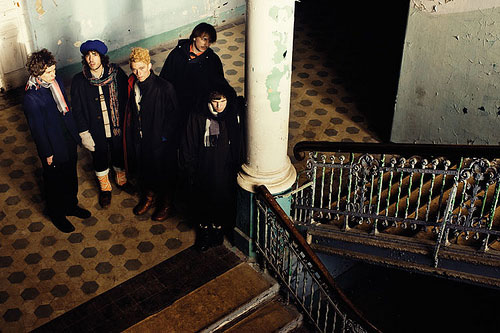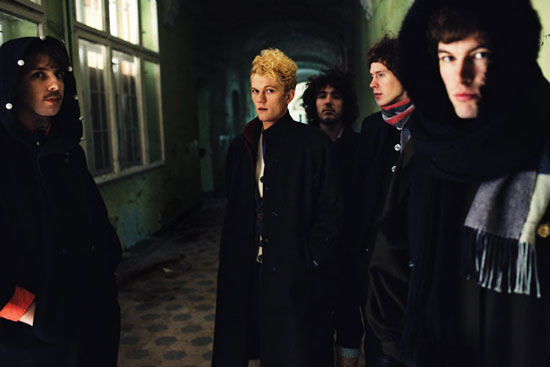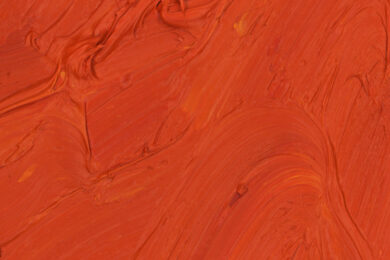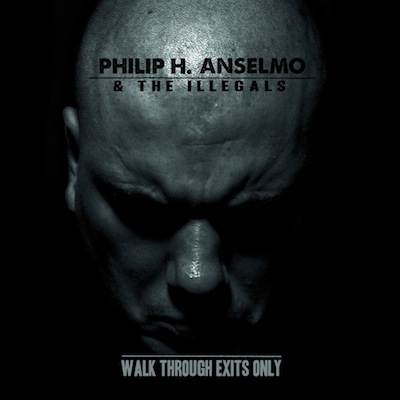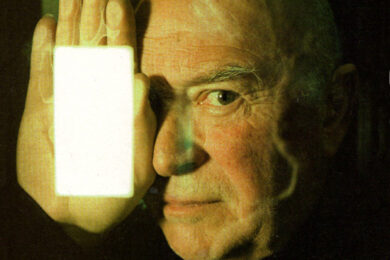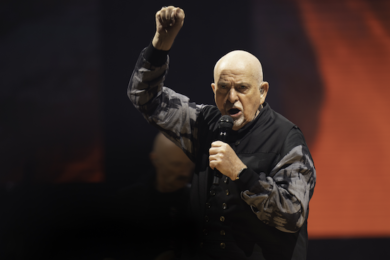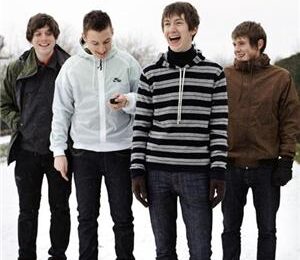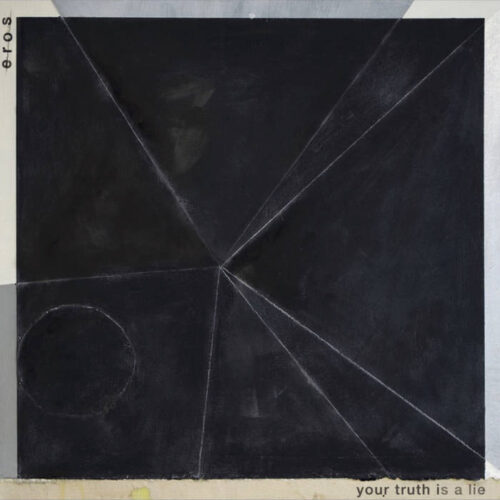It’d be all too convenient to be able to liken Oh No Ono’s hypnagogic sound to the fairytales of fellow Dane Hans Christian Andersen. In reality they’re far more Grimm than that, creating terrible Freudian prog dreamlands and watery metaphors where snowy mothers melt away and a shoal of siren ballerinas lure wretched souls down to their depths. Their incredible second album, Eggs, comes out on The Leaf Label this February — it’s a world away from the shiny, Clor-like new wave of their debut, Yes, instead dealing in hauntingly glam, Arcade Fire-style orchestral bombast and the most polarising falsetto since Joanna Newsom.
The Quietus caught up with keyboardist Nicolai Koch to discuss recording in German military hospitals, Aqua, and Wall-E…
Hello Nico, how are you?
Nico Koch: I’m fine thank you. I’m back in Copenhagen, we just got back from touring Denmark and then going on a small tour with Mew afterwards. We’re going to England now, today, and then we’ll go to the US to do a few shows afterwards and in the beginning of next year we’ll do Europe and go back to the US again.
How did you meet?
NK: The rest of the guys are all from Jutland, from the mainland of Denmark, and they started the band maybe five or six years ago, and I am the most recent member and I entered about two years ago after they did the first record, so I met them in Copenhagen, and the others met in Aalborg.
There seems to be a difference in the sound between Yes and Eggs – do you think you joining the band played a role in that?
NK: After I joined? Well I don’t think it’s all because of me! I think the first record was produced by Jesper Mortensen from Junior Senior, they broke up. He’s still in I Scream Ice Cream, they’ve done a record with about four songs, they’re all like 10, 20, 30 minutes long. So he did the first record, which was more of a concept album, this new wave, disco funk album.
Were you in a band before you were in Oh No Ono?
NK: Yeah I was in a band called Boomclap Bachelors, we had a little success in England, and I used to play in Choir Of Young Believers.
It’s surprising you say that Yes is a concept album – it seems like Eggs is much more so. There seems to be a lot of recurring lyrical themes, like ice melting to water, these dark fairytale images. Is that not how you see it?
NK: It’s not a concept album, it’s just to try all the ideas that we could come up with, and then we would make endless lists every day of what we wanted to try out, and then work until we tried everything, so that’s why it sounds so weird, I guess!
The breadth of influences on the record is incredible. Can you talk us through how you put it together?
NK: First we write by having just one person writing the verse, another guy writes the chorus, we get all these pieces of music and in the end, we sit with it and try to put it together, to see what fits. Sometimes we write a whole song, usually it’s just little pieces we put together. Then we listen to it and say like, “Oh this has a watery feeling to it,” so we want to have the sound of diving into water and coming up to the surface again. Then we would go out and record water sounds and add them on top of it. I used to work with a lot of synthesizers so in my case I wanted to do something else, so I recorded a lot of pianos, organs and church organs, and then messed the sounds up afterwards to make them sound like synthesizers. We tried to do different stuff.
How much did recording on the island of Mon affect the sound? It seems like an incredibly isolated place to go to make an album.
NK: I think it had the effect of us just focusing on making music, we would work all day and then when some people wanted to go to bed – usually we worked in teams – when I went to bed, somebody else got up and started working, we were working constantly for the whole time. And we were close to nature, so we had a small digital recorder that we could use to record ship sounds, and I went out and recorded a lot of frogs!
Were you there consistently over the nine months the record took to make?
NK: In Mon? No, no, we started the recordings there, it was an old farmhouse and we went there and laid down the drums and the bass and more basic stuff. Then afterwards we went to Sweden to record some of the strings and then to this church that we rented in Copenhagen to record – they have a really, really old church organ, I think it’s 500 years old or something like that. Actually they have two church organs, that’s why we chose it. A really big one and a really old one. I think you can hear it really clearly in the beginning of ‘The Wave Ballet’, you can hear the old small church organ, it sounds really beautiful. We recorded the choir on that track in the church as well.
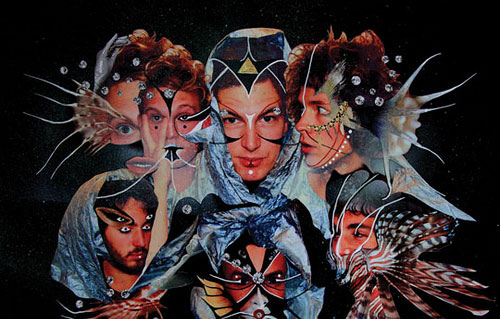
What did you record in the disused military hospital in Germany?
NK: The hospital’s called Beelitz, it’s the name of the last track on the record. I think it became a psychiatric hospital after the war, and a military hospital during the First World War, and afterwards the Soviet Union used it a lot as a military hospital too, and apparently Hitler has been there too with, I don’t know, some broken bones!
What drew you to a place like that?
NK: I think we had this myth of abandoned buildings that we wanted to check out, we were going to Berlin anyway so it was not that long a drive out of the city. We went to check it out, it was really beautiful, and we had all our equipment. It seemed to fit.
The composition on the album is incredible – are you classically trained at all?
NK: I think Nils, our bassist, has a little, he went to the Conservatory. And Morten Svenstrup, from a band called Under Byen, he helped us out with some of the string arrangements, he’s a cellist and they’re really great. Then we have Kristoffer, our drummer, his sister plays classical percussion so she plays some of that on the record. The rest of the stuff was just trying to mimic classical stuff, I think we tried to imitate those things.
This seems like a really banal question, but the range of influences on the album is huge – how did you accumulate them?
NK: They come from all sorts of stuff – I think it also comes from being done over a long period of time, one month we would be listening intensely to Kraftwerk, and the week after to old school hip hop, then we went to a Black Dice concert and wanted to do noise stuff and ended up doing one of the sections in ‘Beelitz’ – I think that song sounded quite differently from that, then we went to the Black Dice concert, came home and wanted to fuck it up! There’s all types of stuff on it. A lot of people say that it sounds like early Pink Floyd, early Genesis, Gentle Giant, all sorts of prog stuff, but we listen to almost anything.
This may have been taken out of context, but in one interview you seemed to say that Aqua were your main influence, that they were the ultimate Danish band?
NK: [Laughs] They’re not our main influence! But I think I was talking about Danish groups – if I had to choose a Danish group then there are some better ones, but I think Aqua are great.
Over here they never got a lot further than ‘Barbie Girl’.
NK: That’s great! I think we were trying to talk about how extreme they were, not music-wise. I think that they’re good at writing pop songs, but they’re not that inspiring. What is inspiring is that before they came out I don’t think I remember anything sounding like that, and afterwards everyone wanted to make pop songs that sounded that way. So with this really crazy concept that became really big, that’s really inspiring. I remember before they got signed, no-one wanted to because they were so silly, they sounded like children’s songs, but they believed in it and succeeded, that’s the thing I think we liked about it.
What were the obstacles that you ran into whilst making it?
NK: I think mostly just time, getting sick of working on the same songs for so long. Then you make something and think it’s really good, and you want to bring the rest of the songs up to the same level, to make all the songs even better. You keep pushing the ambition.
Which would be the one that brought all the others up?
NK: I think it used to be ‘Swim’, now I think I’m more into ‘Internet Warrior’.
I wanted to ask about that – from reading the lyrics, is it about disliking technology and the internet?
NK: No, I think that the title only came a long time after the lyrics were written, I think it’s actually more of a song about growing up and discovering love and [laughs] how you’re supposed to be a grown up. I think Mathe came up with the title, you’d have to ask him! He’ll have some clever reason about why it’s called that. I think it’s inspired by people on chat boards and how the easy way of dealing with life is to say that people are shit without having to confront them [laughs].
Do you all write lyrics, or is there a main songwriter?
NK: Usually there are some words or sentences that come out, usually we just start singing gibberish while we write songs, so I think that there are a few lines in each song that just come out of the subconscious when we start singing, then you get inspired by that and we all try to come up with verses, and then one guy goes, “Oh! I like this part,” then someone changes another bit.
Is that naturally how Malthe sings?
NK: Yeah. There are effects on parts of some songs, but mostly just reverbs, and sometimes we have to pitch him down! He sings very high-pitched and with this funny nasal sound [laughs]. He said once that he came up with it because he was walking around at home, singing ‘Baby You Can Drive My Car’, and all of a sudden he came up with that voice and claimed it!
It’s a trademark that’s served you well, but from reading the only English reviews I could find, it seems that his voice is quite divisive. Is that a common response?
NK: I think some people think it sounds like we’re not being serious, they want a deep male vocal perhaps. With some of the songs I thought they sounded too much like classical rock compositions, and then when Malthe started singing over the top they sounded like crazy Oh No Ono music! It’s also really crazy that you can add that to something and it sounds fresh again.
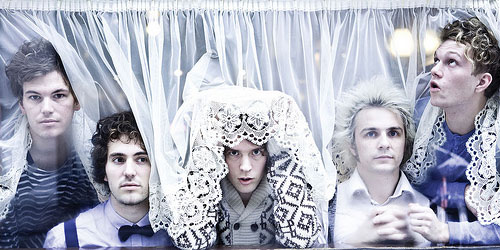
You just said “crazy Oh No Ono music” – how would you characterize yourselves? It’s really hard to say what kind of band you are.
NK: That’s very hard to say. Another woman who interviewed me said we were not a rock band, which really annoyed me! I really think we made some kind of classical rock album with this record, it reminds me of what I consider to be rock music, like the Stones and the Beatles. I think the vocals make it something different, and there’s all sorts of inspiration from hip hop and Detroit, but I don’t think it’s any different from when the Beatles got inspired by Indian music. I think it’s just that rock and punk music should always try to adapt things from other kinds of music. So I just consider us rock music.
About the lyrics – you said they start as gibberish and eventually come together, but there seems to be a mythology, and an amount of Freudian analysis you could read into them. Like in ‘Icicles’, the snowman sings that his mother is the snow of his body and that she’s melting – it’s very sinister. Is that going too far, to look into them to that extent?
NK: No, not at all. I think most of that came from Aske, and I think he’s nailed it really well, it’s these very unconscious thoughts that you have when you’re a child, like, “I would never go into the wrong house and help the wrong mother.” I don’t think we had a masterplan of what it was supposed to mean, but more the feelings you have when you’re a kid, like when you’re in a supermarket and you pull the wrong woman’s leg to ask for something. That scary idea when you start to realise that your mother’s just another person.
‘Helplessly Young’ and ‘Eve’ seem to fall outside the mystical narrative that’s going on elsewhere, they seem a lot more rooted in real, and genuinely heartbreaking stories. Are they supposed to be set aside from the rest of it?
NK: ‘Eve’ is very personal, they’re Aske’s lyrics. You know, in a way we always try to mix everything up, to give the music some sort of twist, and this song became ‘Eve’ after Aske went to see Wall-E! And he really loved that, so that’s in there as well. It’s a very serious relationship song that somehow was also inspired by this Pixar children’s movie! I think that’s a good way to see how the songs are built up. ‘Beelitz’ is actually Malthe trying to deal with him impregnating this very Christian girl when he was a kid, at a very young age, and trying to deal with it, but it just sounds like crazy cartoon music. Some of it sounds very personal and isn’t, and some of it sounds very childish and is actually really personal. It’s all twisted and mixed up!
In France they seem to have a real problem with French bands singing in English – is that the same in Denmark, or is it generally accepted that to find an audience you have to sing in English?
NK: In the 1980s everybody was singing in Danish, and then while we were growing up nobody sang in Danish, everyone was trying to make grunge music in the 90s, like that Seattle sound. But then I think the last couple of years everyone’s started singing in Danish again, it’s about 50/50, but there’s a lot of really popular acts singing in Danish.
From an English perspective, it seems like a really interesting time in Denmark for music. Would you say that this is a good period or that the international press are lazy and not looking often enough?
NK: I think it’s a really interesting time, I think the last time we had such a big music scene was in the 80s, but back then the quality of music was not as high, it was mostly just dance and trance that sounded like foreign bands, but making the songs into Danish, or translating. And now I think that a lot of people are trying to do something else, to make up their own sounds, and get inspired by something new, to make something original. I guess it just comes from Junior Senior and The Raveonettes, and Aqua – people see that you can try to do something else and that it can be appreciated outside Denmark, they get the courage to do something different.
Are there a lot of external, international influences that come into Denmark, or was it more insular? What was it like to grow up in Denmark, culture-wise?
NK: I think sometimes that music-wise, it can be a blessing because you grow up and every time you hear some band, even if it’s just some pop group, you can imagine them being from somewhere fantastic, like England or America – they seem to be somewhere that only the stars live, you know! America’s just what you see in the movies, and England’s the same. They seem to be these incredible places where everyone’s really cool rockstars. When you sit down and try to make something, you try to imagine yourself as something more than life somehow. On the other hand, you grow up and you have to make up everything yourself, but I think that’s a good thing as well.
